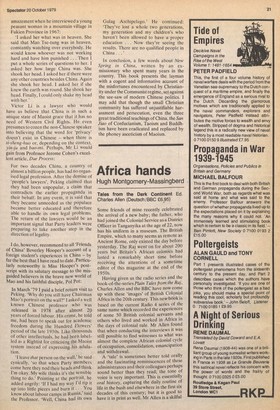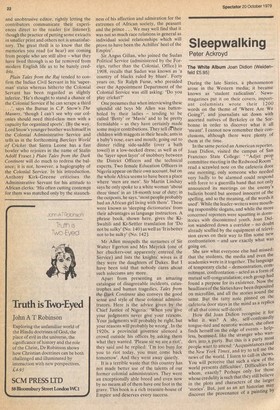Africa hands
Hugh Montgomery-Massingberd Tales from the Dark Continent Ed. Charles Allen (Deutsch/BBC £6195) Some friends of mine recently celebrated the arrival of a new baby; the father, who had joined the Colonial Service as a District Officer in Tanganyika at the age of 22, now has his uniform in a museum. The British Empire, which to many seems as remote as Ancient Rome, only existed the day before yesterday. The Raj went on for about 200 years but Britain's African colonies had lasted a remarkably short time before receiving the attentions of a sometime editor of this magazine at the end of the 1950s.
Having given us the radio series and the book-of-the-series Plain Tales from the Raj, Charles Allen and the BBC have now come up with these 'images' of British Colonial Africa in the 20th century. This new book is based on the current Radio 4 series of the same name which recorded the experiences of some 50 British colonial servants and others who lived and worked in Africa in the days of colonial rule. Mr Allen found that when conducting the interviews it was still possible to find witnesses to what was almost the complete African colonial cycle of occupation, consolidation, emancipation and withdrawal.
A 'tale' is sometimes better told orally and the fascinating reminiscences of these administrators and their colleagues perhaps sound better than they read; the tone of voice is very important. This is essentially oral history, capturing the daily routine of life in the bush and elsewhere in the first six decades of this century; but it is good to have it in print as well. Mr Allen is a skilful and unobtrusive editor, rightly letting the contributors communicate their experiences direct to the reader (or listener); though the practice of putting some extracts in smaller print and others not is unsatisfactory. The great thrill is to know that the memories you read (or hear) are coming from people who are still alive — what they have lived through is so far removed from modern English life as to be barely credible.
Plain Tales from the Raj tended to confirm the Indian Civil Servant in his 'superman' status whereas hitherto the Colonial Servant has been regarded as slightly inferior. 'He's thought to stand a chance of the Colonial Service if he can scrape a third . . .', says the Bursar in C.P. Snow's The Masters, 'though I can't see why our colonies should need third-class men with a capacity for organized sports'. (By the way, Lord Snow's younger brother was himself in the Colonial Administrative Service and tells us in the forthcoming Barclays World of Cricket that Sierra Leone has a fast bowler who rejoices in the name of Stalin Adolf Fraser.) Plain Tales from the Dark Continent will do much to redress the balance; it is not, however, a hagiography of the Colonial Service. In his introduction, Anthony Kirk-Greene criticises the Administrative Servant for his attitude to African clerks: 'His often cutting contempt for them was matched only by the staunch ness of his affection and admiration for the extremes of African society, the peasant and the prince. . We may well find that it was not so much race relations in general as individual social relationships which will prove to have been the Achilles' heel of the Empire'.
Sir Angus Gillan, who joined the Sudan Political Service (administered by the Foreign, rather than the Colonial. Office) in 1908, recalls that Sudan was known as 'a country of blacks ruled by blues'. Forty years on, Sir Ralph Furse, who presided over the Appointment Department of the Colonial Service was still asking: `Do you play cricket?'
One presumes that when interviewing these splendid old boys Mr Allen was buttonholed by their ladies — tending to be called 'Betty' or 'Mavis' and to be pretty formidable — as they have certainly made some major contributions. They tell ortheir children with maggots in their heads; ants in a baby's nose, ears and mouth; going out to dinner riding side-saddle (over a bath towel) in a low-necked dress; as well as of the 'layer upon layer' of snobbery between the District Officers and the technical experts. Two female Education Officers in Nigeria appear on their own account, but on the whole Africa seems to have been a place where 'men are men'. Sir Martin Lindsay says he only spoke to a white woman 'about three times' in an 18-month tour of duty; in the outposts, he says, 'most people probably had an African girl living with them'. These were known as 'sleeping dictionaries' from their advantages as language instructors. A phrase book, shown here, gives the KiSwahili and Ki-Settler translation for 'Do not be sulky' (No. 140) as well as 'It is better not to be sulky' (No. 142).
Mr Allen misspells the surnames of Sir Walter Egerton and Mrs Meyrick (one of her chuckers-out apparently entered the Service) and lists the knights' wives as if they were the daughters of Dukes. But I have been told that nobody cares about such solecisms any more.
Apart from presenting an amazing catalogue of disagreeable incidents, catastrophes and human tragedies, Tales from the Dark Continent also conveys the good sense and style of these colonial administrators. Here is the advice given by the Chief Justice of Nigeria: 'When you give your judgments never give your reasons. Your judgments will probably be right, but your reasons will probably be wrong'. In the 1920s, a provincial governor silenced a crowd outside his offices by asking them what they wanted. 'Please sir we are a riot', they said and he replied: 'I'm too busy for you to riot today, you must come back tomorrow'. And they went away quietly.
It is a terrible waste that this country has not made better use of the talents of our former colonial administrators. They were an exceptionally able breed and even now by no means all of them have one foot in the grave. This book is a rich treasure-house of Empire and deserves every success.







































 Previous page
Previous page